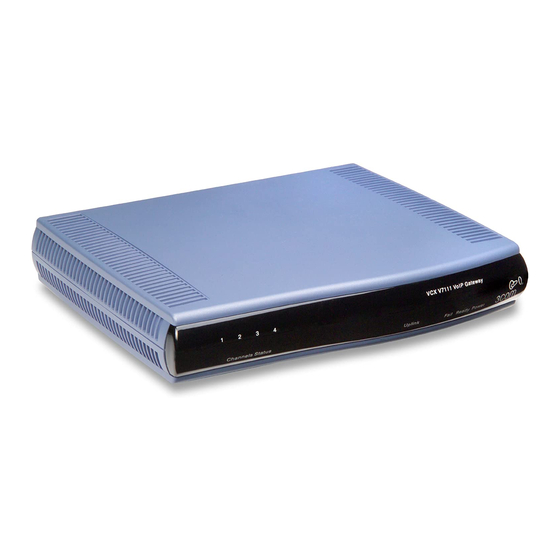3Com AirProtect Sentry 5850 Hızlı Başlangıç Kılavuzu - Sayfa 9
Ağ Geçidi 3Com AirProtect Sentry 5850 için çevrimiçi göz atın veya pdf Hızlı Başlangıç Kılavuzu indirin. 3Com AirProtect Sentry 5850 15 sayfaları. Secure converged networks enterprise edition
Ayrıca 3Com AirProtect Sentry 5850 için: Veri Sayfası (4 sayfalar), Ürün Kılavuzu (15 sayfalar)

R
I
EGULATORY
The 3Com AirProtect Sentry, Model WL-548 (3CRWX5850GS) must be installed and used in strict accordance
with the manufacturer's instructions as described in the user documentation that comes with the product.
This product contains encryption. It is unlawful to export out of the U.S. without obtaining a U.S. Export
i
License.
This product does not contain any user serviceable components. Any unauthorized product changes or
modifications will invalidate 3Com's warranty and all applicable regulatory certifications and approvals.
Only antennas specified for your region by 3Com can be used with this product. The use of external amplifiers or
non-3Com antennas may invalidate regulatory certifications and approvals.
This product can only be used with the supplied antennas.
CAUTION: E
XPOSURE TO
This device generates and radiates radio-frequency energy. In order to comply with FCC radio-frequency
exposure guidelines for an uncontrolled environment, this equipment must be installed and operated while
maintaining a minimum body to antenna distance of 20 cm (approximately 8 in.).
The installer of this radio equipment must ensure that the antenna is located or pointed such that it does not
emit RF field in excess of Health Canada limits for the general population; consult Safety Code 6, obtainable
from Health Canada's website www.hc-sc.gc.ca/rpb.
This equipment complies with IC radiation exposure limits set forth for an uncontrolled environment. End users
must follow the specific operating instructions for satisfying RF exposure compliance. This equipment should be
installed and operated with minimum distance 20 cm between the radiator and your body.
This product must maintain a minimum body to antenna distance of 20 cm. Under these conditions this product
will meet the Basic Restriction limits of 1999/519/EC [Council Recommendation of 12 July 1999 on the limitation
of exposure of the general public to electromagnetic fields (0 Hz to 300 GHz)].
US — R
F
ADIO
REQUENCY
This device must not be co-located or operated in conjunction with any other antenna or transmitter.
This device is for indoor use only when using channels 36, 40, 44 or 48 in the 5.15 to 5.25 GHz frequency range.
High power radars are allocated as primary users of the 5.25 to 5.35 GHz and 5.65 to 5.85 GHz bands. These
radar stations can cause interference with and/or damage this device.
FCC N
OTICE
To comply with FCC Part 15 rules in the United States, the system must be professionally installed to ensure
compliance with the Part 15 certification. It is the responsibility of the operator and professional installer to
ensure that only certified systems are deployed in the United States. The use of the system in any other
combination (such as co-located antennas transmitting the same information) is expressly forbidden in
accordance with FCC rules CFR47 Part 15.204.
USA—F
C
EDERAL
OMMUNICATIONS
This equipment has been tested and found to comply with the limits for a Class B digital device, pursuant to Part
15 of the FCC Rules. These limits are designed to provide reasonable protection against harmful interference in
a residential installation. This equipment generates, uses and can radiate radio frequency energy and, if not
installed and used in accordance with the instructions, may cause harmful interference to radio communications.
However, there is no guarantee that interference will not occur in a particular installation. If this equipment does
cause harmful interference to radio or television reception, which can be determined by turning the equipment
off and on, the user is encouraged to try to correct the interference by one or more of the following measures:
• Reorient or relocate the receiving antenna.
• Increase the separation between the equipment and receiver.
• Connect the equipment into an outlet on a circuit different from that to which the receiver is connected.
• Consult the dealer or an experienced radio/TV technician for help.
The user may find the following booklet prepared by the Federal Communications Commission helpful: The
Interference Handbook. This booklet is available from the U.S. Government Printing Office, Washington, DC
NFORMATION
R
F
ADIO
REQUENCY
R
EQUIREMENTS
C
OMMISSION
R
ADIATION
(FCC) EMC C
OMPLIANCE
9
